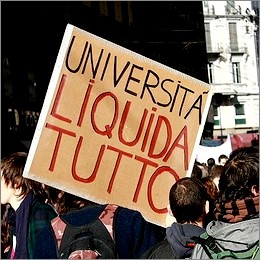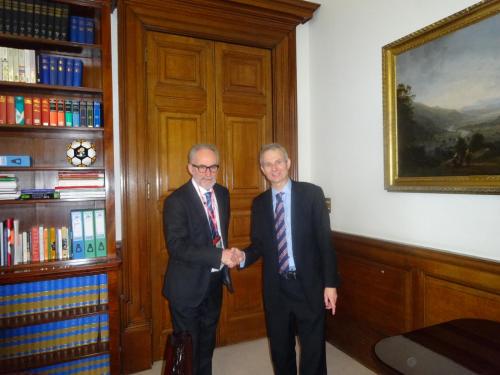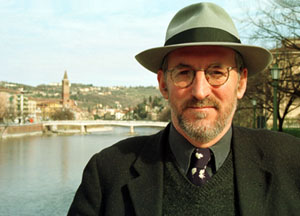Comment: EU's role in "Ghettoisation" of foreign lecturers in Italy
DAVID PETRIE
|
27 April 2014

Student protests against the Gelmini law
DURHAM -The EU's institutions reinforce discrimination of lettori in Italy's universities, foreign lecturers head David Petrie tells a symposium on Native-speakerism.
In a speech at Durham University being delivered on Monday to the 1st International Symposium on Native-Speakerism, Prof. Petrie, a lecturer at Verona University and chair of the ALLSI lecturers' union, discloses support for the discrimination both in the European Commission and the European Court of Justice. Prof. Petrie entitled his speech "Roots and branches: the institutions of the European Union and the ghettoisation of native speakers in Italian universities."
"Commenting on the feasibility of an international union of states Bertrand Russell said that if culture were not to suffer, some way would have to be found of combining cultural independence with political unity" Prof. Petrie says. The text of his speech was made available in advance to the Italian Insider.
Prof. Petrie continues: "What he did not indicate was how this was to be achieved in cases where the endemic corruption of the social culture of a state is inextricably bound up with the institutions of that state.
"Compare Russell’s comment with that attributed to Giovanni Giolitti who said that laws are enforced on enemies and interpreted for friends. It should be noted that – if we exclude Mussolini, for reasons which are not entirely obvious – Giolitti was Italy’s longest serving prime minister 1 year and 136 days longer than Silvio Berlusconi, who, we should note, was brought down by the law, not by the electorate.
"And finally, we should contrast Russell’s and Giolitti’s dictum with that of Lord Denning who famously, if somewhat pompously, said, “Be you ever so high, the law is above you.”
"DISCRIMINATION: Professor Brad Blitz, in his Stanford PH.D, and two subsequent essays, accrued copious empirical evidence on discrimination against native speakers teaching in Italian universities and found institutional patterns of behaviour working against the goals of EU integration.
"In this paper I will provide evidence that these institutional patterns of behaviour are to be found in the institutions of the EU.
"Commenting on the European Court of Justice’s failure to fine Italy (case C-119/04 of 18 July 2006), despite condemning it for infringement of its previous judgments, the distinguished jurist Professor Sir Neil MacCormick (who was a member of the European Parliament at the time) commented
“What trust can we citizens place in our rights under the treaties if a cosy club of Commission, Court and member state can agree that wrong has been done yet fail to ensure that wrong is righted.”
"At a law seminar held at the University of Trento on 13th February 2007, now retired German, ECJ judge Ninon Colneric, one of the 13 judges adjudicating the case, blamed the Commission for failing to challenge evidence put to the Court by the Italian authorities and blamed the ECJ for following the rules of French administrative law at the expense of fairness and Justice adding that the plaintiffs must have been very very disappointed. Full citation.
"In a previous publication, I outlined, how the ghettoisation was carried out. A brief summary will suffice.
"In 1984 I was employed to teach English language and literature, I was a full member of the examining boards, setting and grading both written and oral exams and working on the supervision of theses.
"Along with hundreds of non-Italian native speakers, I went to court to seek equality of treatment under EU single market rules that prohibit discrimination based on nationality.
"Our names were deleted from the internal phone books and from the doors of our offices. We were ordered to move, the stated pretext was that the office needed to be gutted of asbestos, though my Italian colleagues, who shared the same space, received no such expulsion orders.
"Myself and 13 others were ordered into a basement room measuring 6 metres by 4 and it was from this room, which we called 'the bunker' that our political campaign was spearheaded.
"A smear campaign was orchestrated against me, targeting my published work. A defamatory letter purporting to come from Berkeley turned out to be a forgery. This and other correspondence was seized in the faculty office following a magistrate’s injunction and I was eventually awarded damages in the courts.
"I was sacked and eventually reinstated, after 4 years, by the Italian Supreme Court and I am currently working, without a contract, under the protection of that judgment.
"I now occupy, along with other non-Italian native speakers, space in the basement in what is called a Linguistic Centre, a glorified language lab, in reality a linguistic ghetto.
"Apartheid requires its own micro-language in order to disguise its ugliness. We are no longer teachers but “collaborators and linguistic experts” providing entirely fictitious “teaching support” to the real (Italian) teaching staff. We no longer “examine” students we, “test” them. There are countless other grotesque fictions which we and the students live with. The results are a catastrophe. In the pre-apartheid days, third year students had to sit an exam which included a three page essay on a chosen topic or literature.
"These days, they do a perfunctory computer test and write between 200 and 250 words on a given topic.
"Here is an example of one student’s exam or test. It contains 100 words – 100 short of the requirement.
When I was sixteen years old I made a cultural exchange in England with my class. We caught the aeroplane and we arrived that wonderful country in the evening. We visited London, the Oxford School, the Windsor castle and the Warwick castle.
London is very beautiful with its Big Ben, the Parliament and Buckingham Palace. It’s wonderful to cross the London Bridge and to pass under the Towers Bridge. The big streets are always crowded and full of shops. There are also the red buses with two floors, the typical element of England. The Oxford school is an ancient school.
For this, the student is award a pass at C1, that is to say, Effective Operational Proficiency of the Common European Framework.
RACCOMANDAZIONI: Turning now to the recruitment of teaching staff. There are countless articles and newspaper reports on the system of “raccomandazioni” the systematic rigging of exams for tenured posts. I will limit my remarks to two sources.
Professor Cesare Cecioni, former director of Florence University’s language teaching centre, quoted in the THES, 13th February 1998, telling a conference of lettori in Bologna in January 1998:
“It seems the lettori (non-Italian native speakers) have still not understood that tenure has nothing to do with teaching: it rather concerns the privileges that a professor enjoys. If you were to apply for promoted posts you would have no chance of success. As we would be judging you, it would simply be the slaughter of the innocents.”
Philosophy professor, Marcello Pera, a former president of the Italian senate:
“Even though distinguished colleagues say I shouldn’t, I still say that these rigged university competitive examinations are scandalous … rigged public examinations aside, the university is itself a scandal.”
and he goes on to make a comparison with
“…a true corporative Soviet structure where no criticism of the system is permitted, or in a Mafia “cosca” clan where anyone who challenges the rules pays for the “affront”.
EUROPEAN PARLIAMENT: At a European Parliamentary hearing in Brussels I attempted to explain the concept and the ramifications of “raccomandazioni”. I was shouted down by Italian MEPs, the chairman had to intervene, and the meeting was cut short in acrimony.
Subsequently I attended a meeting in Bologna, where one of the persons representing the Italian state in Brussels, Bruno Civello alleged that I had, in the European Parliament denounced his country as a country run by the Mafia. I rose, denied his allegation, and invited him to withdraw his remark. He refused, whereupon the rector of the University of Naples, Professor Adriano Rossi, also present in the room, and also a representative at the hearing in Brussels, repeated Civello’s allegation.
"I raised an action in the Bologna courts.
"The judge of first instance refused to accept as evidence, a tape recording of my Brussels speech, given to me by a correspondent working for The Guardian and the THES. She ruled the tape inadmissible on the grounds that it was not an official recording.
"I subsequently visited the archives of the Parliament to discover that the official tape of my speech had been removed from its carton. A back-up copy in French had been obliterated at the point where I was called to speak by the chairman.
"I reported alleged theft and alleged damage to intellectual property to the Brussels police and they intervened. Furthermore, on my lawyer’s instructions I informed the then president of the European Parliament, Nicola Fontaine, that if the tape was not recovered, I would raise an action against the Parliament for the sum being sued for in Bologna.
"The tape was recovered and the Bologna judge ruled in my favour on the, by then, incontrovertible facts.
"INFRINGEMENT PROCEEDINGS/EUROPEAN COMMISSION: During the course of infringement proceedings, launched by the European Commission, Commissioner Flynn, appointed an expert, Professor Bruno Nascimbene, to report to him on the factual and legal framework of the lettori case.
"It should be noted here that citizens who complain of a state allegedly infringing EU law, are not party to the pre-litigation stage - nor do their lawyers have any right of access to documents. Your complaint becomes Commission v Italy (or whatever member state). Pre-litigation correspondence between Commission and member state is secret.
"Professor Nascimbene met us in his office in Milan and showed considerable sympathy for our complaint saying we would eventually get a solution – because our case was just, adding that if we had friends in the mafia or the Catholic church we would get a solution more quickly.
"That aside, one may reasonably ask why the Commission approached Nascimbene – and even more so why Nascimbene accepted the task. After all the case was Commission v Italy. Nascimbene’s pay cheques come from the Italian state, worse, one of the Universities cited in the Commission’s pleadings was Milan, where Nascimbene was a full professor of law. A clear-cut conflict of interest.
The non-disclosure of documents at pre-litigation stage is particularly grotesque. The Commission sends documents to the Italian state – but cannot guarantee that the latter will not leak the documents. Indeed several leaked documents arrived in my post box.
Our lawyer commented on these “ … the Commission accepted the deliberately instrumental, unfounded and unproved justifications which have been presented as facts in the defence arguments by the Italian government on the basis of partial information, obvious omissions and at times complete and utter falsehoods (and) has taken a position which is from a legal perspective incomplete, imprecise, unclear and contradictory.”
"The ECJ Court of First Instance (11 December 2001 T-191/99) denied us access to all 16 documents we applied for - some of which were in our possession – others not. It is particularly grotesque to stand in the ECJ asking for “official” access to documents containing falsehoods which affect your life – and be denied access on the grounds that disclosure would not be in the public interest.
These are but a few examples of how the citizen is denied access to justice - he/she has no right of access to the Court of Justice if the law or the measures he/she complains of emanate from a member state. In short, if the Commission does send a case to the Luxembourg court – you might find, as we did, that only a semblance of your complaint is presented - in terms of the factual situation and the legal pleadings.
THE MacCORMICK PAPERS/EUROPEAN COURT OF JUSTICE: So, your complaint, the Commission’s case, goes to Luxembourg – a small country safely tucked away from lobbyists and journalists in Brussels.
"I was extremely fortunate to have had the support, in the European Parliament, of the very distinguished and much loved jurist, the late professor Sir Neil MacCormick Q.C. who died on 5 April 2009.
"MacCormick lodged files in the Centre for Research Collections, Edinburgh University Library. Some of these files concern his work in the European Parliament and of particular interest to me, is his work concerning the “lettori” in Italian Universities. The files are in three categories, open – which I accessed, on 26 October 2010, second category closed until 2034 and third closed until 2104.
"One of the open files contains my letter to MacCormick dated 28 April 2002.
Dear Neil,
This is to confirm that in the course of a recent telephone call to the Italian higher education ministry, I was informed by a senior official that an Italian ECJ Advocate General is currently acting as a consultant to the Italian state on how to solve the lettori problem to its best advantage….
This would appear to be outlawed by Article 223 (ex Article 197) of the Treaty of the European Community which states:
“The judges and Advocates-General shall be chosen from persons whose independence is beyond doubt…”
… See my attached notes
"One of these documents was a telephone note concerning my call to the Italian Higher Education Ministry (26 April 2002) in which I was directed to a Dr. Luppi, who said that he personally would be willing to accommodate some of my suggestions but that his hands were tied by the advice of Advocate General La Pergola, whose letter to the Italian government was on his desk and that Advocate General La Pergola’s advice was the basis of the Ministry’s letter of 27 March (also in the MacCormick files)
"Other notes in the files contain details of a meeting (May 2002) I had with Dott.essa Bianchi Conti of the Department of Community law, in which I mentioned the La Pergola letter – and a fax to her (26 May 2002) which I translated and forwarded to MacCormick.
"In the MacCormick papers – there is a handwritten note from him – 26.5.02 which reads ‘Message(s) received and understood! I am cooking up a small ploy vis a vis the President of the Court … Auguri..
MacCormick brought the matter up with the then British judge in the ECJ, Sir David Edward and reported back to me that Judge Edward had advised that if such information concerning judge La Pergola were to get into the public domain the ECJ would close ranks and defend the institution. MacCormick did not mention which of the two Italian judges he was referring to. In an amusing twist to this, MacCormick recounted to me that judge Edward acknowledged that sometimes the quality of judges was questionable, but assured him that the other Italian judge - judge La Pergola – was a man of the utmost integrity.
"Subsequently, at meeting with several Commission officials I complained of La Pergola’s involvement in the case and Commission lawyer Mr Sjoerd Feenstra, very heatedly told me that if this comes out – you and your cases are finished, thus effectively gagging us.
"The lettori case illustrates that the patterns of behavior which are undermining the goals of integration go beyond the behaviour of Italian universities, bankrolled by their paymasters, the Italian State.
"Italy has now passed legislation (the so-called Gelmini law) limiting the civil rights of the lettori, commented upon by:
Peter Ferguson Q.C. 'An astonishing statutory provision. If other Member States follow Italy’s example, the European project and more importantly, the rule of law are endangered'
"Professor Brad K Blitz ' …in conflict with Article 6 of the European Convention on Human Rights … undermines the primacy of EU law.'
"Professor Noreen Burrows OBE '…has the potential to undermine the authority of the European Court of Justice by appearing to allow Member States to reinterpret the decisions of the Court to suit their purpose of perpetuating discrimination.'
"Using the Gelmini law non-Italian native speakers (and only this category of workers) in Bergamo, Catania and Salento, were recently subjected to pay cuts of up to 50 percent while others have had their court cases extinguished. Unheard of in post-war Europe.
"Yet Commissioner Andor in a reply to European Parliamentary question, 4 April 2014 says : '…the Commission found no evidence of any infringement of EU law'
"Returning to the universities Senator Marcella Pera asks and answers the question:
"'Can anything be done? No. … The Italian university no longer exists. It is dead. It has been killed by a political class that is irresponsible, guilty, short-sighted, homicidal and suicidal, composed (look at the parliaments of the First Republic and the Ciampi and Dini governments) especially of university professors.
"'To ask this political class to provide a remedy for the cemetery it has left behind is like asking Totò Riina to solve the Mafia problem.'
"I take this opportunity to wish the new young Prime Minister of Italy, Matteo Renzi, every success in the renaissance which he aspires to achieve."
Durham, 28 April 2014

David Petrie (left) with UK Europe Minister David Lidington

David Petrie in Verona


